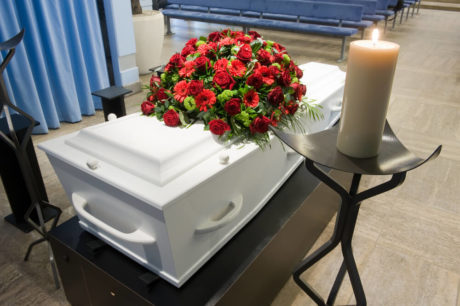Kieran Graham
Read More
Very professional courses. Great Administration assistance and high quality e-learning service.
Sarah Jennings
Read More
I did forex trading diploma. Very professional and detailed course.
Jordan Cooke
Read More
The course offered is excellent. I am glad to have taken it.














Arranging a Funeral
Funerals and memorial services provide an opportunity for family members, friends and others who knew and loved the deceased to gather together to honor and remember the person who died while offering comfort and support to those closest to him or her, and to each other.
Whether planned after a death occurs (an “at-need” situation) or beforehand (a “preneed” situation), arranging a funeral or memorial service often proves an emotional, and sometimes exhausting, process.
A funeral can be either by burial or by cremation. You can organise it with or without the help of a funeral director, and personalise it as much as you wish. In some cases, the deceased may have planned their own funeral.
Timing
Bear in mind that you can’t confirm the date for the funeral until after the death has been registered. If the death has to be reported to the coroner, the date when the funeral can be held will be affected.
Many people choose to use a professional funeral director. Funeral directors can help during what is generally a stressful time, and should see that the remains of the deceased are dealt with in a dignified way. Friends, family, clergy or your doctor may be able to recommend local funeral directors.
Arranging a funeral without a funeral director
You can arrange a funeral without the help of a funeral director. If you wish to do this, contact the Cemeteries and Crematorium Department of your local council for advice and guidance.
Making arrangements
Remember to check the deceased person’s will or other written instructions for special wishes about their funeral or what should happen to their body. However, the executor doesn’t have to follow the instructions about the funeral left in the will.
If there are no clear wishes it’s generally up to the executor/administrator or nearest relative to decide whether the body is to be cremated or buried.
Whether you’re using a funeral director or not, here are some things you’ll need to think about:
Paying for a funeral
If you arrange a funeral, you will be responsible for paying the bill, so first check where the money will come from and that there will be enough.
Most funeral directors require payment before probate (the official proof that a will is valid) is granted. So, it’s worth considering how you would pay for a funeral, whether that amount of money will be readily available and the various ways the costs can be covered.
How to pay:
The bank account of the person who has died will be frozen (unless it is a joint account). In some cases, the bank or building society may agree to release funds to pay for funeral costs, alt
hough they are not obliged to do this until probate is granted. If they don’t release funds, you or the executor may need to pay and then recover the money from the estate later.
What to do after a death
Registering the death
The registration of the death is the formal record of the death. It is done by the Registrar of Births, Deaths and Marriages and you will find the address of the nearest register office in the telephone directory.
When someone dies at home, the death should be registered at the register office for the district where they lived. If the death took place in hospital or in a nursing home it must be registered at the register office for the district in which the hospital or home is situated. In England and Wales, if it is convenient, you can go to a different office to register the death and the details will be passed on to the correct office. You should check the opening hours of the office you wish to go to. S
ome offices have an appointments system.
A death should be registered within five days but registration can be delayed for another nine days if the registrar is told that a medical certificate has been issued. If the death has been reported to the coroner you cannot register it until the coroner’s investigations are finished.
It is a criminal offence not to register a death.
The death should be registered by one of the following (in order of priority):
You cannot delegate responsibility for registering the death to anyone else.
You must take with you the medical certificate of death, since the death cannot be registered until the registrar has seen this. If possible, you should also take the person’s NHS medical card and birth and marriage certificates. The registrar will want from you the following information:-
Forms you’ll be given
When you have registered the death
, the registrar will give you a green certificate (for which there is no charge) to give to the funeral director. This allows either burial or cremation to go ahead. Occasionally a registrar may be able to issue a certificate for burial only (but never cremation) where no one has yet been able to register the death.
The registrar will also give you a form to send to the Department for Work and Pensions (DWP) (In Northern Ireland the Social Security Agency). This allows them to deal with the person’s pension and other benefits.
Death certificate
The death certificate is a copy of the entry made by the registrar in the death register. This certificate is needed to deal with money or property left by the person who has died, including dealing with the will. You may need several copies of the certificate, for which there will be a charge.
Funerals
A funeral can take place any time aft
er death. Anyone close to the person can arrange the funeral.
The person may have left instructions (in their will or somewhere else) about the type of funeral they wanted and/or whether they wanted to be buried or cremated. There is no legal obligation for relatives to follow these instructions. In some cases, relatives may want burial or cremation to take place abroad. The rules about this are very complex and the help of a specialist funeral director will be needed. Permission from a coroner is always needed before a body can be sent abroad.
If there are no relatives or friends to arrange a funeral, in England and Wales, the local authority or health authority will arrange a simple funeral. In Northern Ireland, the local Health and Social Services board can do this.
The public authority that arranges the funeral will then try to recover the cost from any money left by the person who died. If the money left isn’t enough, the public authority can sometimes recover the funeral cost from a spouse or civil partner (but not from anybody else).
Funeral directors
Most funerals are arranged through a funeral director (who used to be known as an undertaker). It is important to find a funeral director who belongs to one of the professional associations, such as the National Association of Funeral Directors (NAFD) or the Society of Allied and Independent Funeral Directors (SAIF), since these associations have codes of practice and complaints procedures. Some local authorities also run their own funeral services by arrangement with a local firm of funeral directors. If a funeral director is not a member of a professional association or a complaint is not dealt with satisfactorily, you may need to take legal action against the funeral director.
Funeral costs
The person who arranges the funeral is responsible for paying the final bill and it is important to know where the money for the funeral will come from. The person who died may have taken out a pre-paid funeral plan, paying for their funeral in advance. It is important to check their personal papers to see if they had a plan. If they did, this should cover the whole cost of the funeral.
If there is no funeral plan, the cost of the funeral will normally be met out of any money left by the person who had died and, where money has been left, the funeral bill should be paid before any other bills or debts. Even if the person’s bank account has been frozen following the death it may be possible to have funds released from a building society or national savings account on showing the death certificate. The person may also have had an insurance policy which will cover funeral costs. In other cases, relatives may need to borrow money until the person’s money and property are sorted out. Some funeral directors will allow payment to be delayed until this has happened.
Some people do not leave enough money to pay for even a simple funeral. If this happens, the person arranging the funeral will have to pay for it, although other relatives or friends may be willing to contribute. There is no general death grant, but if you are in this situation and you receive a means-tested social security benefit (such as income support) you may be able to get a payment from your local council (known as a funeral payment) to cover the cost of a simple funeral. Even where a funeral payment is made, it may not cover the full cost of the funeral and you may still have to pay the difference.
The funeral director should always give a written estimate of the cost of the funeral, but the final bill may be higher. The bill will cover the costs of burial or cremation, the fees for the funeral service and the professional services of the funeral director. There will also be charges for extras, such as flowers, cars, service sheets and newspaper notices.
Other costs
Anyone who receives a means-tested benefit (such as income support) may be able to receive help from the Department for Work and Pension’s or in Northern Ireland the Social Security Agency’s social fund through a budgeting loan towards the cost of travelling to the funeral of a close relative.
If the person who is paying for the funeral is receiving a means-tested benefit it may be possible to receive help through a funeral payment towards the cost of travelling to the funeral.
Burial or cremation
A burial can take place in a churchyard, a local authority cemetery or a private cemetery. Burials can also take place on private land, or in a woodland site, although in Northern Ireland this will have to be approved by the authority responsible for the site.
Anyone living within the parish has the right to be buried in the parish churchyard, if there is space, or in any adjoining burial ground. Some churches may allow others to be buried there as well (for example, ex-parishioners or those with family graves). There is no right to be buried in any particular part of a churchyard or burial ground.
Burials inside a church are not allowed in urban areas and are very rarely allowed elsewhere.
Most cemeteries are owned by local authorities or private companies and are non-denominational although some have space dedicated to particular religious groups. In the case of a local authority cemetery, anyone living in the authority’s area has the right to burial in the cemetery. Others may also be allowed burial, but for a higher burial fee.
In most cemeteries, there are various categories of graves. Some graves do not give exclusive rights to burial while others give the right of exclusive burial for a set period of time. It is important to check the papers of the person who has died to find out if they have already purchased a grave space in a churchyard, cemetery or woodland burial ground. Although there is no law preventing burials on private land (including a garden) anyone wishing to do this should contact their local authority, who may issue a certificate confirming that the burial is lawful.
Funeral service
The person arranging the service may choose any form of service. If you do not want any form of religious ceremony, the British Humanist Association can give advice on a non-religious (secular) service.
Disposal of ashes
Ashes may be scattered or buried at the crematorium, either by crematorium staff or by relatives and friends. Ashes can also be buried in a churchyard or cemetery, often with a short service.
Ashes can generally be scattered anywhere, but if you wish to scatter ashes on private land you should get consent from the landowner.
Although UK law allows ashes to be taken abroad, many countries have strict rules on the importation of ashes and it is important to check before travelling.
Memorials
Churchyards and cemeteries have firm rules about the size and type of memorials that are allowed and it is important to check on these rules before ordering anything. Church of England churchyards usually has more rules than local authority cemeteries. Some woodland cemeteries permit wooden plaques but most will only allow the planting of a tree. In Northern Ireland, you should contact your local minister, clergyman or parish priest before arranging the erection of a memorial. The design of the memorial may be subject to approval.
The funeral director will usually apply to the church or cemetery authority for permission to erect a memorial. The authority will normally charge for giving its permission. Names of local monumental masons can be obtained from the National Association of Memorial Masons.
At a crematorium there will often be a Book of Remembrance and relatives may pay for an entry. It may also be possible to buy a memorial bush with a plaque.
If those attending a funeral have been asked to make donations to a charity, the funeral director will normally collect these and send them on to the charity. Relatives will be given a list of donations received.
-

Add a note